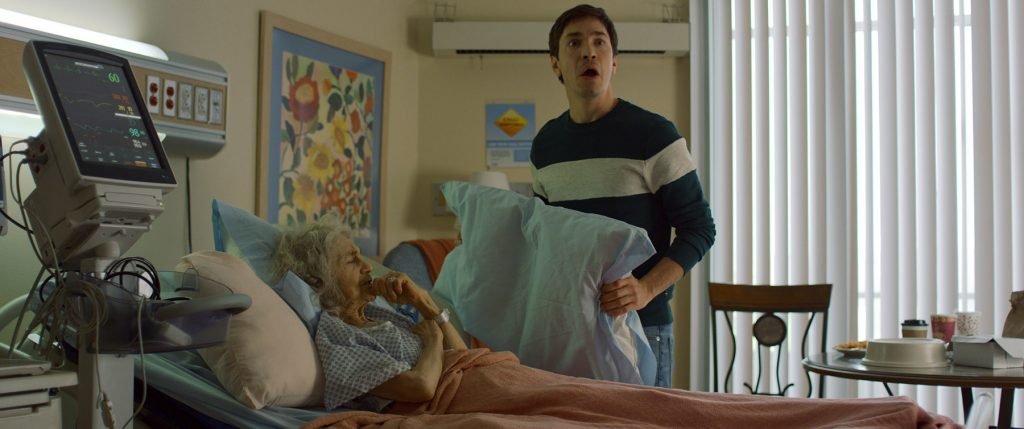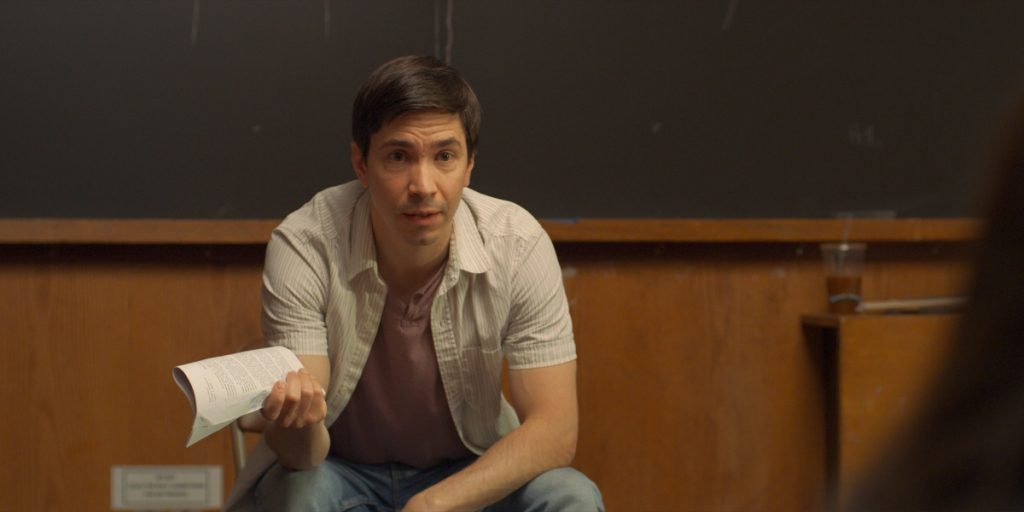Daniel Schechter’s Safe Spaces intertwines grief, trauma, and the boundaries of offence in a surprisingly sensitive way.
In the opening scene of Safe Spaces, writer-director Daniel Schechter’s film that ostensibly concerns college political correctness, we’re introduced to protagonist Josh Cohn (Justin Long) teaching a class in creative writing, pressing a student into revealing an incredibly personal sexual experience. When a different student lodges a complaint about his behaviour, and several other students boycott his class in support, Josh’s professional career begins to fall apart around him. It’s a slow, excruciating downfall, and one that is only exacerbated by his self-destructively adamant refusal to apologise for what he still sees as a harmless exercise in drawing out personal experience. Even when faced with a sympathetic school board and as many second and third chances as can be mustered, Josh simply cannot take the easy way out – not from any detectable malice or ill will, but from a straightforward inability to listen to advice.
Meanwhile, another story runs almost in completely disconnected parallel. Josh’s family have gathered around his dying grandma Agatha (the late Lynn Cohen), and he has to deal with his sister Jackie (Kate Berlant) sharing his apartment. He also desperately searches for some form of reconciliation between his mother (Fran Drescher) and father (Richard Schiff), as each of them attempt to process Agatha’s impending passing in their own, often bizarre ways. This plot feels as though it could have been lifted directly from The Meyerowitz Stories or The Farewell, and indulges in that same gallows humour that almost inevitably springs from prolonged grief – when Agatha tells Josh that she has no desire to keep living, and he mock-threatens to smother her with a pillow, it feels, somehow, genuinely heartfelt – right up until a nurse walks in. The film is genuinely funny, and weaves tragedy and comedy together such that both feel like extensions of the other.
One may be forgiven for struggling to connect the two seemingly entirely disparate storylines, storylines that only incredibly rarely make any attempt to overlap or connect. Indeed, the only constant between them is Josh himself, and his hapless yet well-meaning attempts to stand by a warped and short-sighted sense of self-righteousness that guide him into increasingly messy dead ends. To this end, Long is impressive: just about likeable enough that his decisions seem, to some extent, rationalizable, and yet sufficiently pitiable that his numerous missteps evoke sadness, rather than scorn. His family, Schiff in particular, provide beautifully flawed voices of reason throughout, and their interactions are laced with a familiarity that feels deeply and distinctly comforting. These are not, and do not feel like, people with well-laid plans or perfect reasoning, but human beings simply trying to process loss.

It is also natural, perhaps, to be a little apprehensive about a movie, written and directed by a white man, that takes some kind of aim at modern day college campus approaches to political correctness. Indeed, this is a fear I held coming into a movie that, when Googled, gives results instead for a film by right-wing propagandist Dennis Prager (this is probably the reasoning behind the film’s renaming to After Class for its US release). It was a pleasant relief, then, that Safe Spaces does make a genuinely concerted effort to deal in these issues even-handedly. By the film’s conclusion, it’s more than obvious that all of Josh’s professional issues are the result of nothing more than stubbornness and a reluctance to self-inspect, and there’s a scene in which two white male students come to Josh with outright support and admiration before being swiftly and convincingly dismissed. Those who arrive at this film with expectant glee that it will help prove their own fears about the very idea of “safe spaces” would do well to see themselves reflected here.
For at its core, the issue revolves around protection and security for those who need it most. At the centre of Josh’s turmoil is a female student, the survivor of sexual assault, for whom these discussions don’t concern hypothetical codes of conduct but deeply painful reminders of trauma and grief. As the film continues apace, and as Josh struggles to stop talking for long enough to allow himself to hear these concerns, we as spectators feel them being submerged beneath Josh’s own sensations of loss, so that they may appear forgettable and unimportant in the grand scheme of life. When they are allowed to bubble to the surface, the raw, ugly truth of trauma is woundingly apparent, and the film’s transference of this from protagonist to spectator is remarkably and gut-wrenchingly effective.
Those who arrive at Safe Spaces with firm ideas of what the film will tell them will likely feel as though those ideas have been proved correct. In many ways, the film could be far more explicit in its disavowal of these ideas. But it is a picture made by, and likely for, a specific audience – those for whom these discussions are merely political, who occupy a state of blissful detachment from arguments that, for many others, are an unavoidable part of their lives. Safe Spaces knows the limits of its own perspective, and through its examination of a more familiar kind of grief it speaks to those who struggle to relinquish the reins of a conversation that they should never have led – sometimes, the most important thing to do is to shut up.
Released as After Class in the US, Safe Spaces is now available on digital and on demand.

